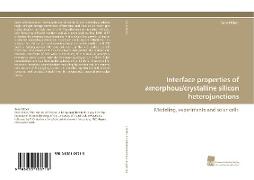- Start
- Interface properties of amorphous/crystalline silicon heterojunctions
Interface properties of amorphous/crystalline silicon heterojunctions
Angebote / Angebote:
Solar cells based on monocrystalline silicon (c-Si) can potentially achieve high sunlight energy conversion efficiencies and thus could reach grid parity despite the high cost of c-Si. The efficiency of standard c-Si solar cells featuring diffused emitters and aluminum back surface fields (BSF) is limited by interface recombination. Alternatively the growth of intrinsic/doped amorphous silicon (a- Si:H) layer stacks on c-Si effectively passivates the c-Si surface and simultaneously forms the emitter and BSF. Such Si heterojunction (HJ) solar cells can use thin c-Si wafers, benefit from low production cost of a-Si:H layers and enable the highest efficiencies. The focus of this work is the study of interfaces in a-Si:H/c-Si heterostructures, particularly the electronic quality of the a-Si:H/c-Si heterointerface and its effect on the subsequent a- Si:H/c-Si HJ solar cell fabrication. Interface recombination modeling by considering the amphoteric nature of Si dangling bonds is in excellent agreement with measurements, and provides insight into the microscopic passivation mechanisms.
Folgt in ca. 10 Arbeitstagen
